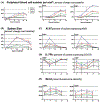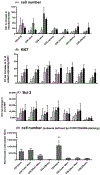Perspective on potential clinical applications of recombinant human interleukin-7
- PMID: 20074272
- PMCID: PMC6545488
- DOI: 10.1111/j.1749-6632.2009.05075.x
Perspective on potential clinical applications of recombinant human interleukin-7
Abstract
Interleukin-7 has critical and nonredundant roles in T cell development, hematopoiesis, and postdevelopmental immune functions as a prototypic homeostatic cytokine. Based on a large body of preclinical evidence, it may have multiple therapeutic applications in immunodeficiency states, either physiologic (immuno-senescence), pathologic (HIV) or iatrogenic (postchemotherapy and posthematopoietic stem cell transplant) and may have roles in immune reconstitution or enhancement of immunotherapy. Early clinical development trials in humans show that, within a short time, rhIL-7 administration results in a marked preferential expansion of both naive and memory CD4 and CD8 T cell pools with a tendency toward enhanced CD8 expansion. As a result, lymphopenic or normal older hosts develop an expanded circulating T cell pool with a profile that resembles that seen earlier in life with increased T cell repertoire diversity. These results, along with a favorable toxicity profile, open a wide perspective of potential future clinical applications.
Conflict of interest statement
Conflicts of Interest
The authors declare no conflicts of interest.
Figures


Similar articles
-
Phase I study of recombinant human interleukin-7 administration in subjects with refractory malignancy.Clin Cancer Res. 2010 Jan 15;16(2):727-35. doi: 10.1158/1078-0432.CCR-09-1303. Epub 2010 Jan 12. Clin Cancer Res. 2010. PMID: 20068111 Free PMC article. Clinical Trial.
-
Administration of rhIL-7 in humans increases in vivo TCR repertoire diversity by preferential expansion of naive T cell subsets.J Exp Med. 2008 Jul 7;205(7):1701-14. doi: 10.1084/jem.20071681. Epub 2008 Jun 23. J Exp Med. 2008. PMID: 18573906 Free PMC article. Clinical Trial.
-
IL-7 administration drives T cell-cycle entry and expansion in HIV-1 infection.Blood. 2009 Jun 18;113(25):6304-14. doi: 10.1182/blood-2008-10-186601. Epub 2009 Apr 20. Blood. 2009. PMID: 19380868 Free PMC article. Clinical Trial.
-
Cytokine signals in T-cell homeostasis.J Immunother. 2005 Jul-Aug;28(4):289-94. doi: 10.1097/01.cji.0000165356.03924.e7. J Immunother. 2005. PMID: 16000945 Review.
-
Harnessing the biology of IL-7 for therapeutic application.Nat Rev Immunol. 2011 May;11(5):330-42. doi: 10.1038/nri2970. Nat Rev Immunol. 2011. PMID: 21508983 Free PMC article. Review.
Cited by
-
Interleukin-7 links T lymphocyte and intestinal epithelial cell homeostasis.PLoS One. 2012;7(2):e31939. doi: 10.1371/journal.pone.0031939. Epub 2012 Feb 27. PLoS One. 2012. PMID: 22384106 Free PMC article.
-
Enhancing of cerebral Abeta clearance by modulation of ABC transporter expression: a review of experimental approaches.Front Aging Neurosci. 2024 May 30;16:1368200. doi: 10.3389/fnagi.2024.1368200. eCollection 2024. Front Aging Neurosci. 2024. PMID: 38872626 Free PMC article. Review.
-
An overview of cytokines and cytokine antagonists as therapeutic agents.Ann N Y Acad Sci. 2009 Dec;1182:1-13. doi: 10.1111/j.1749-6632.2009.05382.x. Ann N Y Acad Sci. 2009. PMID: 20074270 Free PMC article.
-
Trial watch: Dendritic cell-based interventions for cancer therapy.Oncoimmunology. 2013 Oct 1;2(10):e25771. doi: 10.4161/onci.25771. Epub 2013 Jul 29. Oncoimmunology. 2013. PMID: 24286020 Free PMC article. Review.
-
Immunotherapeutic effects of IL-7 during a chronic viral infection in mice.Blood. 2011 May 12;117(19):5123-32. doi: 10.1182/blood-2010-12-323154. Epub 2011 Mar 23. Blood. 2011. PMID: 21436066 Free PMC article.
References
-
- Fisher AG, Burdet C, Bunce C, et al. 1995. Lymphoproliferative disorders in IL-7 transgenic mice: expansion of immature B cells which retain macrophage potential. Int. Immunol 7: 415–423. - PubMed
MeSH terms
Substances
Grants and funding
LinkOut - more resources
Full Text Sources
Other Literature Sources
Research Materials

